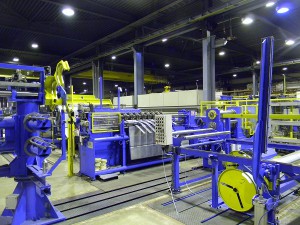
Paolo Gabella, co-owner of Gabella Macchine S.p.A. at Crevacuore (BI), tells about his company and new demands by customers.
«Our company, founded in the Thirties, designs and sells slitting, cut-to-length, recoiling and combined lines for the sheet metal working worldwide. 70% of our turnover comes from export and, moreover, we have an order portfolio that covers at least 5-6 months of work. If we operated in Italy only, this would not be possible». Each machine is specifically designed upon customers’ requirements, so that it has special technical specifications. «Recently – further adds Paolo Gabella, co-owner of Gabella Macchine S.p.A. – we are working on more and more performing recoiling and slitting machines, with a very high automation level and, especially, able to machine from bigger and bigger coil sizes. Today, the “normal” 10 tons are no more sufficient, it is necessary that machines can work also from 20-, 30-ton coils. Besides, also thicknesses have “grown”: while until shortly ago our production was focused on sheet metals from 0.5 mm up to 1.5 mm, today customers ask for a much wider array of possibilities, from 0.4 mm to 4 mm. Besides, also the material types to be machined have increased: pre-painted or zinc-coated steels, laminations, aluminium, copper, stainless steel etc. Clearly, to grant this widening of the application possibilities, we had to redesign the machine structure, besides developing and refining the handling system».

Paolo Gabella ends: «We are standardizing the software control for all of our lines and machines. In this way the advantage is not only for the user, which can manage the whole corporate production with a single supervisor technician but also for us producers, since we can grant a faster and more efficient after sale service». Paolo Gabella ends with the difficulty of hypothesizing, for the future, really new technological solutions: «Actually, it is hard to identify still unexplored application. Perhaps, an interesting case to be developed might concern so subtle thicknesses, that is to say of 0.15 mm, that in such case metal coils can be compared only to “paper rolls” and then they must be machined only with adequate devices. They are still infrequent demands, but I do not exclude that such technology can be more developed in the future».



